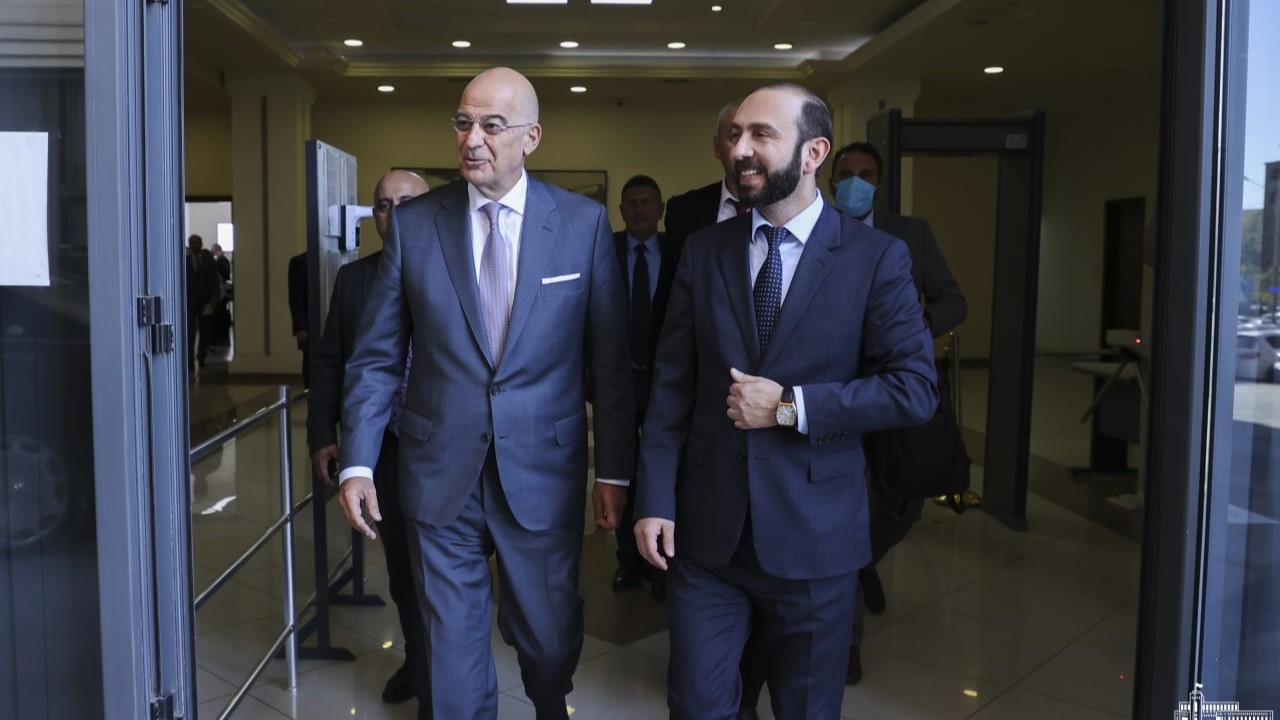Greece’s Foreign Minister Nikos Dendias has visited Yerevan, meeting with his Armenian counterpart, Ararat Mirzoyan on Tuesday.
Dendias’ official visit to the Armenian capital comes just days after his visit to New York where he and Prime Minister Kyriakos Mitsotakis participated in the 77th session of the United Nations General Assembly.
Ι was welcomed by #Armenia FM @AraratMirzoyan in #Yerevan, following the 🇬🇷🇦🇲🇨🇾meeting on the margins of #UNGA in NY last week. Agenda: bilateral relations, cooperation within trilateral schemes, current developments in the #Caucasus region & #EasternMediterranean,🇪🇺-🇦🇲relations. pic.twitter.com/HlqmALocjY
— Nikos Dendias (@NikosDendias) September 27, 2022
Speaking after his meeting with Armenia’s Minister of Foreign Affairs, Dendias said Greece “supports the sovereignty and territorial integrity of all states,” with Armenia being no exception.
“We believe in the inviolability of borders and I am referring to the incidents that happened just a few days ago, after the shelling of Armenian territory, including populated areas, by the Azeri (Azerbaijanis) military forces,” Dendias explained.
“I am here to express our solidarity with the Armenian government and the Armenian people. The historical relations between our two countries date back many centuries. The significant Armenian community in Greece, which includes thousands of Greek citizens, is a strong link.”
The Greek Foreign Minister went on to describe the Azerbaijani attack as evidence of a revisionist policy attempting to redraw borders.
“I would like to send a clear message to countries that seek to redraw borders. And my message is that revisionist policies will fail,” he said.
“Speaking of revisionist forces, let me refer to one of them, Turkey, which is trying to take advantage of the recent turmoil to undermine, either in the Caucasus or in the Aegean, peace and stability.”
I would like to send a clear message to countries that seek to redraw maps. And my message is that revisionist policies will fail (statement following my meeting with Armenian counterpart Ararat Mirzoyan). pic.twitter.com/9hR5Ou29yJ
— Nikos Dendias (@NikosDendias) September 27, 2022
“We believe that humanitarian issues must be resolved immediately and that International Humanitarian Law must be respected,” he added.
In his statement, Dendias also highlighted that the pair had the chance to review Greece and Armenia’s “excellent bilateral relations”, adding that the two nations are tied by “historical tragedies.”
“We are united by historical tragedies. The Greek Parliament recognised the Armenian Genocide in 1996. The Armenian Parliament recognized the Greek and Assyrian Genocide in 2015,” he said.
Minister Dendias went on to meet with Armenia’s Prime Minister, Nikol Pashinyan and Defence Minister, Suren Papikyan later in the day.
During my visit to #Yerevan, I was received by #Armenia PM @NikolPashinyan, in the presence of #Armenia FM @AraratMirzoyan & DefMin S.Papikyan, to discuss 🇬🇷-🇦🇲 relations & developments in the #Caucasus region, and underscored #Greece’s full solidarity with #Armenia. pic.twitter.com/UqCZMoQdt8
— Nikos Dendias (@NikosDendias) September 27, 2022
READ MORE: Greeks join Armenians and Assyrians at Sydney march to condemn Azerbaijani aggression

